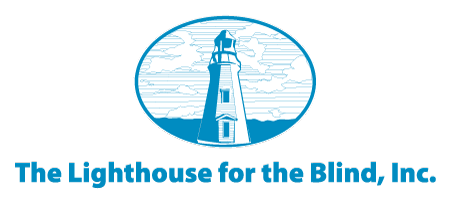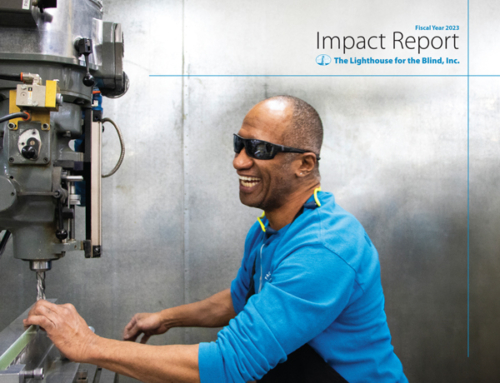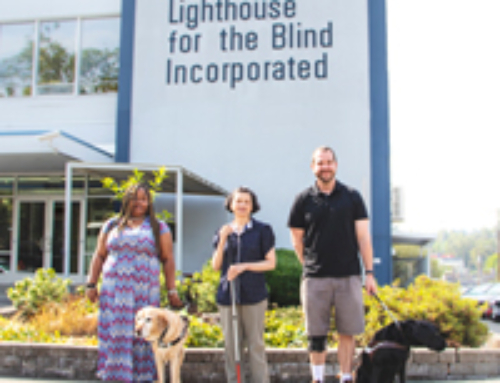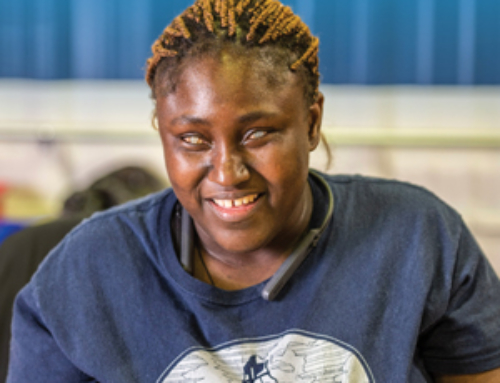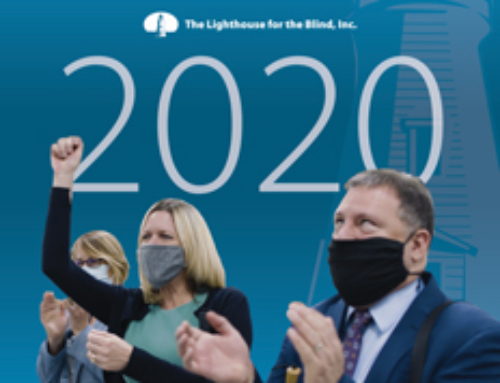2009 was a busy year for the Employee and Community Services (ECS) department. It is with great pleasure that we are able to report on the continued expansion and advancement of the programs and services we provide to people with visual disabilities. Thank you to the donors and volunteers who make the continued success of these programs possible. We could not do it without you!
Braille Literacy
Seattle Lighthouse began its braille literacy program in 2007 and these classes have been growing ever since. Julie Brannon continues in her role as Braille Instructor providing uncontracted (Grade 1) and contracted (Grade 2) braille instruction for new and continuing students, as well as instruction on using a braille display, the Perkins Braille Writer, and slate and stylus. The Braille Blazers Reading Club is going strong, and provides a fun, interactive way for more advanced braille readers to continue to improve braille competencies and reading speed.
Computer Training Program (CTP)
With one part time and two full time instructors, we served more blind employees wishing to increase their computer skills. CTP was launched in 2007 for Lighthouse employees who are blind or have low vision to increase their knowledge of computers and assistive technologies. CTP staff provide one-on-one training using assistive technology such as JAWS and ZoomText with computer applications, from keyboarding and introductory computer skills to more advanced applications and internet use.
During the past year, several computer stations were placed throughout our Seattle and Spokane facilities to provide greater access to job related information for employees. These computer kiosks have stimulated even more interest in learning computer basics and are one of many ways employees are using skills learned in the CTP in their daily work.
Planning is in place to expand computer training in two additional areas during fiscal year 2010. We are looking forward to providing Inland Northwest Lighthouse (INL) employees the same opportunities for computer instruction with the addition of an instructor in Spokane, and we plan to introduce small group seminars in Seattle as one more way to respond to employee instructional needs.
Deaf-Blind Program

Participants of the 2009 Deaf-Blind Retreat in Seabeck, WA
The Lighthouse for the Blind Inc.’s nationally recognized Deaf-Blind Program has provided employment, services, and support to Deaf-Blind individuals for the past thirty years. There is no other organization in the Pacific Northwest providing these comprehensive services to Deaf-Blind persons.
For the 31st year, The Lighthouse for the Blind, Inc. hosted a completely accessible, week-long retreat designed expressly for Deaf-Blind adults. Over 80 Deaf-Blind individuals attended the retreat in 2009, supported by over 140 sign language interpreting volunteers. While ordinary daily life presents barriers for Deaf-Blind individuals, the retreat offers a welcoming community of peers and friends who truly understand the experience of living with a dual disability. The retreat is an essential part of the Lighthouse’s mission to serve the needs of people with visual disabilities.
Seattle Lighthouse continued to provide services through our Technology Training Center (TTC) in 2009, designed specifically to serve Deaf-Blind adults in our community by building skills through the use of computer and assistive technology. The program offers training on assistive technologies for both work and independent living, with instructors providing individualized training to each participant to support personal independence, opportunities for upward mobility in the workplace, and increased technological literacy.
Deaf-Blind Community Classes met the needs of employees and community members by providing a forum that gives Deaf-Blind individuals access to basic information unavailable in their everyday lives. Students connect with each other, learn leadership and presentation skills, explore a wide range of subjects, and help American Sign Language interpreters develop Deaf-Blind interpreting skills.
Orientation & Mobility (O&M)

O&M Instructor Meg Johnson (left0 explores a tactile bus route map with machinist George Adams (right)
Orientation and Mobility instructors assisted blind and Deaf-Blind individuals in learning skills to travel independently and safely. Skills instruction includes white cane travel, bus and street route planning, electronic travel aid training, and supplemental guide dog training. Orientation and Mobility instructors meet the needs of numerous employees as they navigate through the ever changing transit landscape of the greater Seattle area, providing ongoing route planning and safe travel techniques. Training includes bus travel, route planning, assistive technology assessment, safety techniques for low-vision travelers, relocation and route planning for new community members, and supplemental training for guide-dog users.
Housing
With housing costs continuing to be some of the highest in the nation, our priority is to support blind and Deaf-Blind individuals in obtaining affordable housing that matches their wants and needs. Our housing support services continue to include support in navigating application procedures to local subsidy programs, identifying apartments matching the needs of the individual, budgeting, and classes providing information on topics such as renter’s rights and responsibilities. In addition, we are partnering with Housing Resources Group (HRG) to address the challenge of finding affordable housing for employees who are new to the area.
Other Employee Supports
During 2009, we partnered with the Seattle Public Library to provide English as a Second Language (ESL) classes for Lighthouse employees. These popular classes covered several work related topics and included a vocabulary and pronunciation group practice.
Monthly Community Resource Information sessions were added in 2009 to provide employees with information about resources and information available to them in the community. Representatives from several organizations came to present information at these always well attended sessions, including Interconnections, Metro Accessible Services and ORCA presentations, a demonstration of the KNFB reader, and several others.
Government Relations
Our Government Relations work continues to focus on the education of an array of public officials about the Lighthouse’s employment opportunities, products, programs, services and capabilities. To do this effectively, we have increased training and coaching supports to 16 employees who are blind or Deaf-Blind, and who have been instrumental in our outreach efforts. Through our government relations efforts, we were awarded a federal appropriation, which will allow us to enhance and expand travel training in King, Pierce, and Spokane counties. We have also enjoyed opportunities to team with other community organizations who collectively were successful in establishing a Seattle Disability Commission. We were proud to join others in the blind community, working with state legislators, in a successful effort to maintain the Dept. of Services for the Blind as a separate entity reporting to the Governor as opposed to a proposed structure shift to the Department of Social and Health Services.
Thanks to the generous donations from community donors, all ECS programs are available free-of-cost to our participants, with the exception of the Deaf-Blind Retreat. There is a tuition fee to attend the Deaf-Blind Retreat, with scholarship funds available.
